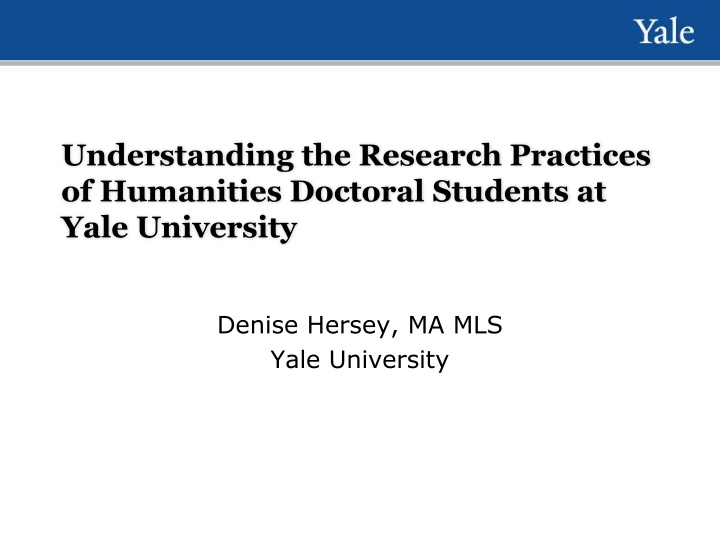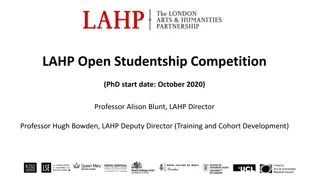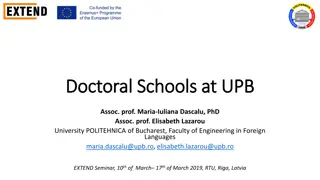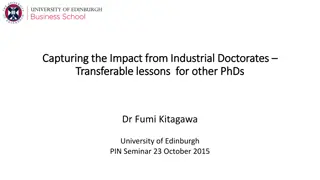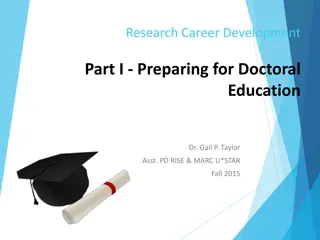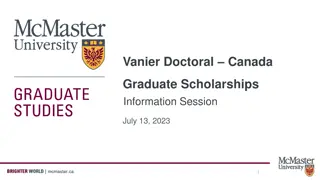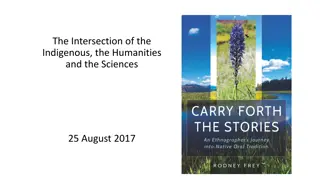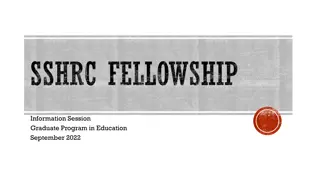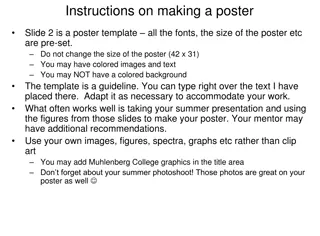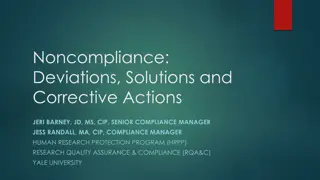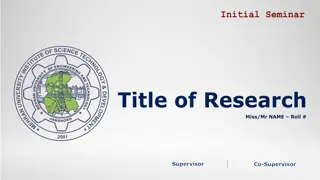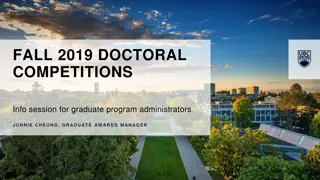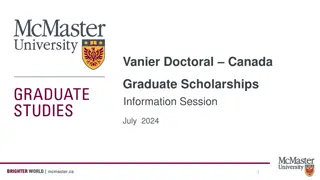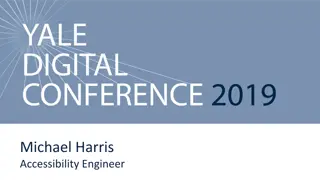Research Practices of Yale Humanities Doctoral Students
This study delves into the research practices of humanities doctoral students at Yale University, exploring their approaches to identifying and accessing research materials. Insights from interviews shed light on their strategies, challenges, and preferences in scholarly research.
Download Presentation

Please find below an Image/Link to download the presentation.
The content on the website is provided AS IS for your information and personal use only. It may not be sold, licensed, or shared on other websites without obtaining consent from the author.If you encounter any issues during the download, it is possible that the publisher has removed the file from their server.
You are allowed to download the files provided on this website for personal or commercial use, subject to the condition that they are used lawfully. All files are the property of their respective owners.
The content on the website is provided AS IS for your information and personal use only. It may not be sold, licensed, or shared on other websites without obtaining consent from the author.
E N D
Presentation Transcript
Understanding the Research Practices of Humanities Doctoral Students at Yale University Denise Hersey, MA MLS Yale University
Graduate Students in the Humanities Yale report, 2011: Improving Graduate Education at Yale University Net 6 Yr. Cost to GSAS per Student (stipend, teaching, fees): Humanities- $143,000 Natural Sciences- $17,421 Social Sciences- $126,339 Median Yrs. to PhD Humanities- 6.7 Natural Sciences- 6.3 Social Sciences- 6.3
Background 2CUL Study Permission and Funding Research Team: 11 Yale librarians IRB approval Nancy Fried Foster Development of survey instrument Two days of training
Interviews 1 hour long/gift cards 27 current students 5 former students 12 programs of study Transcription Coding Recommendations and Developments 4
Identifying Research Materials It usually starts with a little bit of pathetic Googling... And you know when you find an article, it s almost like some weird kind of I don t know how to explain it. You know, it s like a Wikipedia death thread, where you re like, Oh, I m going to read this one article in the bibliography, and then I ll look at the bibliography for another. You know, sort of, you get one reference and it spirals into a lot of references. When I meet with particular professors, they ll often pull something off their shelf . That s one way I find resources.
Identifying Research Materials Starting points for research Google, GoogleScholar, Amazon Citation tracking and browsing Serendipity Human relationships Research Skills Prior experience Coursework Foreign Language skills
Accessing Materials With digital stuff I tend to use that for journal articles. I find e-books to be- while they are super, super useful, especially when books are checked out . . . if I need to work for a long time, physical versions of the book are like way more usable for me. The really frustrating part for me is that the library s hours are in line with the undergraduate calendar so like spring break is when graduate students get all our work done because like that s the only two weeks we have to ourselves in the spring, from teaching and then the library s hours are all reduced. Like working students are here over the summer but then all the library hours are reduced. 7
Accessing Materials Using Yale Library Services Borrow Direct/Scan & Deliver/ILL Non-traditional Formats Non-circulating Materials Library hours Materials outside of Yale Reciprocal borrowing Access to Yale materials outside of Yale Travel: Cost and Time
Organizing Materials I usually take only notes in a note-book .and then afterward this is probably why I don t have that much written on my dissertation because I have a very slow process then I ll go through and highlight or underline in a color the key points that I want for what I m writing, and then I transfer them and then I write it by hand, and then I type it. Sometimes you have to pay a fee to take photographs. Sometimes I cheat and take photographs when they re not looking. I know that there are different software [programs] that organize materials ... I'm not very savvy in tech, so basically I sort of duplicate a physical archive on my Windows 7 computer. 9
Organizing Materials Extracting Information from Archives Portability of digital Combination of photographs, typed notes, PDFs of documents Preference for paper Organizing Printed Scholarship Many ad hoc, creative methods Organizing Notes paper notebooks, Word documents, Adobe Evernote, Scrivner, Zotero, or EndNote Guilt/embarrassment about not being digital enough
Research Habits Everything can easily devolve into reading stuff that s not really related to my dissertation. That and the anxiety of just not being able to write. Your life is a series of tradeoffs. I have a section I m TFing [teaching] for and I can do a great job or a mediocre job or a lousy job and I feel like I m incentivized to do a mediocre job because if I do a great job, it takes more time and . . . there s so much pressure on publishing. [T]his semester I signed up for a dissertation writing workshop through the Writing Center and it is helpful in that it is very productive way of looking at your writing practices and time management techniques. 11
Research Habits Transitions Research, writing, teaching, work, family life Dissertation proposal to writing Transitions and Time Procrastination Teaching Time to teach vs. time to write Dissertation Writing Accountability
Yale Library Spaces " [I wish] that I could leave my own books there, library books there, and not worry about where they're going, and be able to come in just every day with my laptop and get going." "[W]hy is one part of the library deathly hot and another part deathly cold?" I think it s always comfortable to be at home. If you take a break from writing you can get something to eat or drink quite easily. You re never far from your favorite distraction. I also feel like if you check out a bunch of books it s kind of cumbersome to tow them back to the library, and to take them to security
Yale Library Spaces Facilities and furniture Temperature Food and Drink Security (policies) Furniture Other people and noise Bass/undergraduates Available technology Scanners/monitors/printers Working at home
